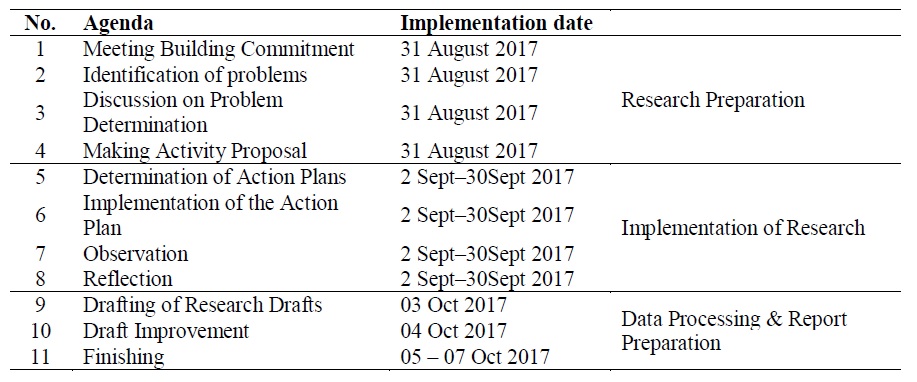
Improvement of Teacher Capability Using Contextual Teaching and Learning Models Through in House Training
Abstract
Keywords
Full Text:
PDFReferences
Daryanto. (2011). Penelitian Tindakan Kelas Dan Penelitian Tindakan Sekolah: Beserta contoh-contohnya. Yogyakarta: Penerbit Gava Media.
Depdiknas. (2007). Pedoman Penilaian Hasil Belajar di Sekolah Dasar. Jakarta: Dirjen Manajemen SD dan Menengah
Faddilaturrahmi. (2016). Peningkatan Hasil Belajar Siswa Pada Materi Jaring-jaring Balok dan Kubus dengan Pendekatan CTL siswa Kelas IV SDN 05 Air Tawar Barat. Jurnal Basicedu, 1(1), 1-9.
Fakhruddin, z., Lilia, H., & T. Subahan Mohd, H. (2017). Practicality Assesment of Student Worksheets for SMP Physics Learning on the Traditional Culture-Based Equipment. Journal of Educational Sciences, 1(1), 65-78.
Hudson, C. C., & Whisler, V. R. (2013). Contextual teaching and learning for practitioners. Systemics, Cybernetics and Informatics, Vol. 6 No.(4), 54–58.
Kokom, K. (2012). The Effect Of Contextual Learning In Civic Education On Students' Character Development. Asia Pacific Journal of Educators and Education, 27 (1), 87-103.
Leonard. (2013). Peran Kemampuan Berpikir Lateral dan Positif Terhadap Prestasi Belajar Evaluasi Pendidikan. Cakrawala Pendidikan, XXXII (1), 54-63.
NCTM. (2000). Principles and Standards For School Mathematics. Reston, Virginia, The National Council Of Teachers Of Mathematics. Inc.
Nurhadi. (2003). Pembelajaran Kontekstual (Contextual Teaching and Learning) dan Penerapannya dalam KBK. Malang: Universitas Negeri Malang.
Peraturan Menteri Pendidikan dan Kebudayaan No. 22 Tahun 2016 tentang Standar Proses Pendidikan Dasar dan Menengah. Jakarta: Depdiknas.
Permatasari, E. A. (2014). Implementasi pendekatan saintifik dalam kurikulum 2013. Indonesian. Journal of History education, 3 (1), 11-16.
Joni, R. (2005). Pembelajaran yang Mendidik: Artikulasi Konseptual, Terapan Kontekstual dan Verifikasi Empirik. Jurnal Ilmu Pendidikan, 12 (2), 56-66.
Sanjaya,W. (2009). Penelitian Tindakan Kelas. Jakarta: Kencana, Prenada Media Group.
Scholaria. (2016). Implementasi TQM melalui pelatihan model IHT untuk meningkatkan kompetensi pedagogik guru SD. Jurnal Pendidikan dan Kebudayaan, 6 (2), 12-21.
Trianto. (2007). Mendesain Pembelajaran Kontekstual (Contextual Teaching and Learning) di Kelas. Jakarta: Cerdas Pustaka Publiser.
DOI: http://dx.doi.org/10.31258/jes.3.3.p.281-291
Refbacks
- There are currently no refbacks.
Copyright (c) 2019 Suhelmidam Suhelmidam

This work is licensed under a Creative Commons Attribution 4.0 International License.
Publisher: FKIP Universitas Riau












